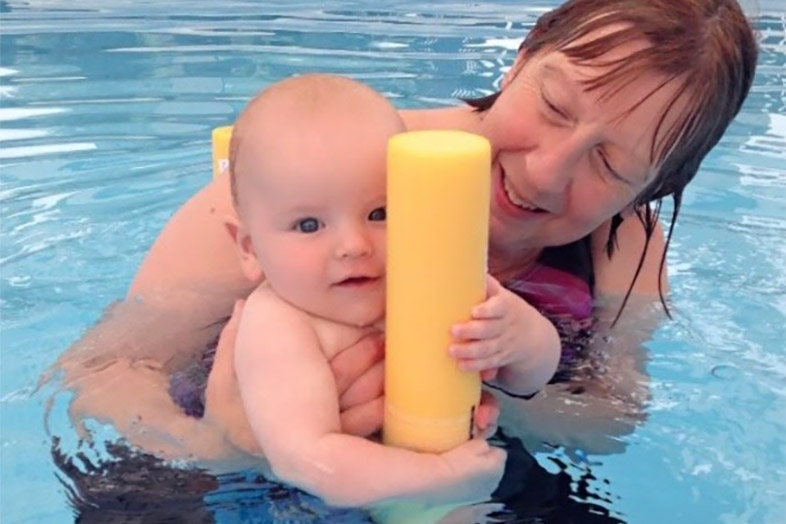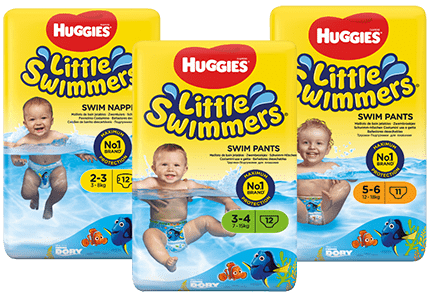How early can babies start swimming?
Babies can begin to swim at any age, right from birth, although the advice is to check with your doctor before starting if your little one was premature. Also, mums – you need to wait for at least seven days after giving birth for your postnatal bleeding to stop.
So, if you’re keen to get your newborn in the pool right away, ask a partner, relative or friend to get involved. It takes a village, as they say.
Early benefits of baby swimming lessons
Being in water is a wonderful experience for babies, and in terms of physical and mental development there are lots of benefits of baby swimming. But why should you take them to the pool for lessons?
1. To help them be more comfortable in the water
Having your little one start swimming lessons early is a fantastic way to build comfort in the water that will last a lifetime. In the short term, it will make them feel safer around all bodies of water, making bath time and even trips to the beach much less stressful.
2. Swimming lessons encourage parent and baby bonding
Baby swimming lessons give you a great opportunity to connect and bond with your baby. They offer an opportunity for you to use skin-to-skin contact as a source of direct comfort while they interact with a completely new environment. With this type of regular activity, you and your baby can really encourage your bond building.
3. It contributes to their sensory development
During their swimming lessons, your baby will be interacting with the water, introducing themselves to new movements and seeing a wide range of new objects. All these new, exciting experiences and sensory stimulation will help their development.
What about injections? Do babies need them before swimming?
NHS guidance states that babies can go swimming at any time, even before they have been vaccinated. It doesn't even matter if they haven't completed their course of injections. Check the NHS facts and our advice on baby injections.

Philomena Geary talks baby swimming advice for beginners
Parenting editor Jo Maggs spoke to Director of 1st Swim School, Philomena Geary for tips on how to help your baby feel confident in the water.
Practice swimming in the bath
You may want to have your partner or a friend with you, just whilst you get used to handling a wet, slippery baby. Make sure that the water’s about 32°C, anything less will be too cold. This also applies to pool water, especially for babies under 6 months old. After a few sessions, introduce a bath toy to play with – this will eventually be a familiar item to bring along to the pool.
Look for ‘baby-friendly pool’
Make sure you are prepared beforehand by packing your baby swim bag essentials. Before you get into the pool, have a quick warm shower while cuddling your baby, gently washing warm water over him or her to prepare them. Talk to them while entering the pool to give lots of encouragement – a visit to the pool is a massive sensory experience for little ones, which they may find overwhelming at first.
Use a swimming ‘cue’ to start activities
Use words for each activity, like ‘bubbles’, ‘kick’ and ‘splash’ which will help your baby to form associations and predict what’s coming next.
Hold them in a way that makes them feel comfortable
Parents should try to ensure that their shoulders are level with the water surface, and they are holding the baby in a loose but close manner in the first instance with plenty of opportunity for reassuring eye contact. As the baby relaxes the parent can extend the hold away from their body allowing the little one to explore. Just ensure that the baby is not inhaling or swallowing water.
Wear Huggies® Little Swimmers® to avoid accidents in the pool
A disposable swim nappy, like Huggies® Little Swimmers®, will protect against leaks, and most importantly won’t inflate with water like a normal nappy, so it helps keep your baby safe (and flexible) too. Some parents will use a neoprene nappy over the top for extra reassurance and peace of mind.
Keep safe by always taking your time in and around the pool
For toddlers who can walk/swim in shallow water make sure that you are no more than an arm's length away (toddlers often have difficulty in regaining a standing position in water).
Are you ready to take your next swimming steps?
Ready to take the next step? Go online or visit your local pool to find a qualified swimming teacher or class. Or ease in with a few short trips with a friend.
Remember you’re not alone. We have a range of advice to help you and your little one master the pool. From keeping your first swim tear free to water games that make every trip to the pool exciting.
Get ready, it’s time for your little one to make a big splash!




 your parenting partner
your parenting partner